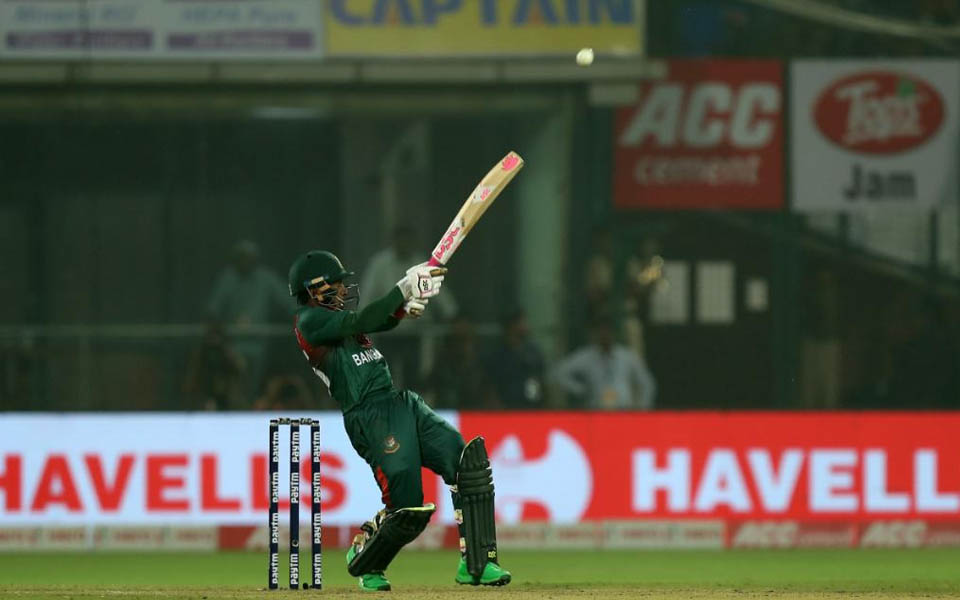New Delhi, Nov 3: Mushfiqur Rahim single handedly fired Bangladesh to their maiden T20I win over India with an unbeaten 60, choking the fancied hosts in the smog-hit series opener here on Sunday.
As cricket took centre stage despite severe pollution, Bangladesh negotiated the pitch much better than India, who made 148 for six on a sticky surface.
The Indian batsmen appeared over-cautious after being invited to bat as the young brigade disappointed the 25,000 strong fans, who braved severe smog to pack the Feroz Shah Kotla ground .
Chasing 149, Bangladesh overhauled the target with three balls to spare to record their first ever win against India in nine meetings.
With Bangladesh needing 22 off the last 12 balls, Rahim (60 not out off 43) smashed four boundaries off as many balls in the penultimate over bowled by Khaleel Ahmed to tilt the game in his team's favour.
He and Soumya Sarkar (39 off 35 balls) added 60 runs for the third wicket to steer Bangladesh closer to victory. The second T20 will be played in Rajkot on Thursday.
After Khaleel cleaned up Sarkar, Rahim was dropped by Krunal Pandya off Chahal when the batsman was on 38.
Bangladesh lost Liton Das (7) early but debutant Mohammed Naim (26) and experienced Sarkar added 46 runs for the second wicket to keep India worried.
Leg-spinner Yuzvendra Chahal tested the Bangladesh batsmen with his variations but Naim and Sarkar played smartly, keeping the scoreboard ticking.
Naim, considered Bangladesh's future star, went after Chahal but ended up giving an easy catch to Shikhar Dhawan at long-on.
The strategy of working the ball around rather than playing aggressive worked wonders for the visitors.
Rahim would have been back in the pavilion had India taken review in the 10th over. Chahal's appeal for an lbw was turned down and replays showed that he was out.
Sarkar swung his arm to produce a massive six off Krunal Pandya as Bangladesh began the push for the win.
There were no demons in the wicket though the odd ball was gripping the surface. None of the Indian batsmen could play a substantial knock after being put in to bat.
At the top, after skipper Rohit Sharma's early dismissal, Shikhar Dhawan scored at a slow pace, managing just 41 off 42 balls.
Dhawan, who has been struggling to find his touch since his comeback, was top-the scorer for India but he consumed seven overs before running himself out and it affected team's scoring rate.
Being the senior most player in the middle after Rohit's dismissal, he needed to stay long at the wicket but took too many balls to score his runs.
Much was expected from India's young brigade but save Shreyas Iyer, none took the attack by the scruff of its neck.
Iyer played an entertaining 13-ball 22 run knock, giving the innings a much needed move on.
Shivam Dube's much-awaited debut ended with just one run while Rishabh Pant managed 27 off 26 balls.
Had it not been for some gritty stroke-making by Washington Sundar (14 off 5 balls) and Krunal Pandya (15 off 8 balls), India would not have got close to the 150-run mark.
Pacer Shafiul Islam (2/36) and spinner Aminul Isam (2/22) shared four wickets between them.
India skipper Rohit, playing his 99th T20I, began by glancing the first delivery from Shafiul to the boundary ropes and also cover drove the paceman for another four as the hosts made a flying start.
However, Islam cut short Rohit's stay by trapping him before the wicket on the fifth ball.
Let the Truth be known. If you read VB and like VB, please be a VB Supporter and Help us deliver the Truth to one and all.
Bengaluru: Whitefield police have arrested two men from Delhi for allegedly stealing mobile phones from passengers travelling in Bengaluru Metropolitan Transport Corporation (BMTC) buses and solved 14 theft cases, officials said on Tuesday.
The arrested accused have been identified as Jai Chand (25), who worked at a hotel in Delhi, and Tarun (34), an autorickshaw driver in Delhi.
Officials said on January 24, a Mahadevapura resident lodged a complaint that his iPhone 15 Plus was stolen while he was travelling on a BMTC bus towards Whitefield.
Based on the complaint, police registered a case and arrested two suspects within an hour near a lodge on Hosa Road. During the arrest, the police found a bag containing several stolen mobile phones.
ALSO READ: Two college dropouts held with drugs worth Rs 10 crore in Bengaluru
“During interrogation, the suspects confessed that they were stealing mobile phones from passengers travelling in BMTC buses. They had also committed thefts during a concert held under the Channarayapatna police station limits on January 23,” the police said.
Investigations revealed that the accused had travelled from Delhi for the concert and stolen mobile phones from the audience. A third suspect is at large and is likely hiding in the Shahdara area of Delhi.
One of the victims, a YouTuber, raised the theft issue in February in a post on X.
“Here is my (FIR No 0013/2026 is registered in Channarayapatana PS. Your GSC No. is PO1814260100013) request @DelhiPolice @BlrCityPolice to plz look into this & get my device back since it's my work phone & I am a youtuber, all my data is there! someone plz help. @dcpwhitefield,” Anirban Sarkar posted on X on February 6.
Police have recovered 14 mobile phones of various brands, collectively valued at about Rs 9 lakh, from the accused. The two were produced before the court and remanded in judicial custody.
In total, one case from Whitefield and 13 from Channarayapatna police stations were detected. Further investigation is underway.




